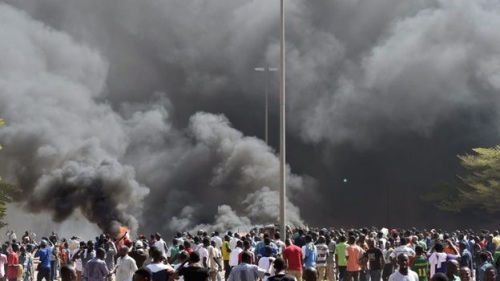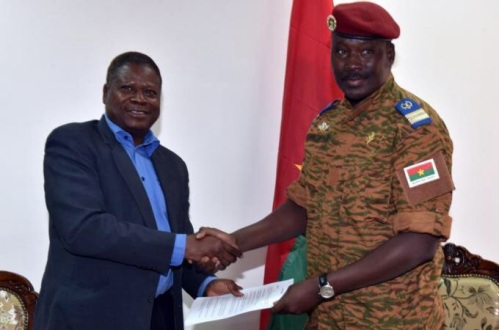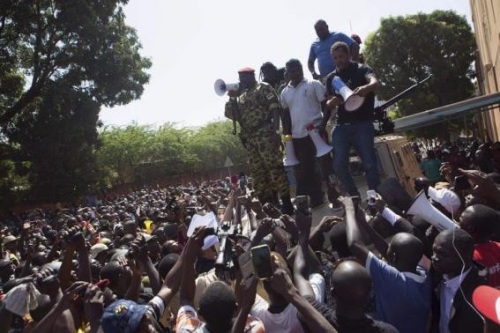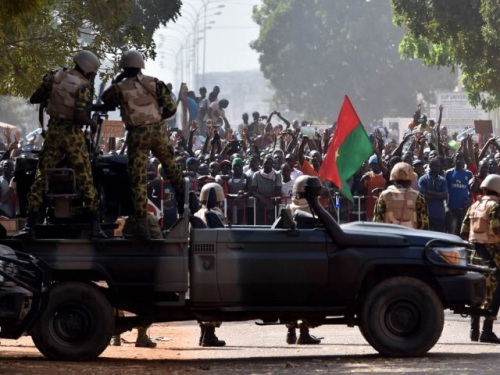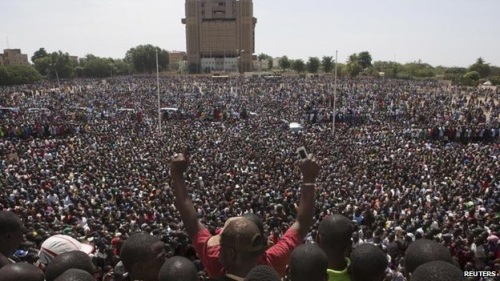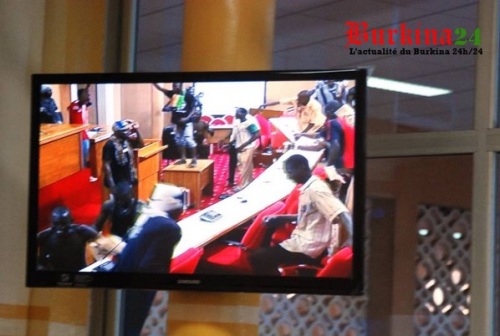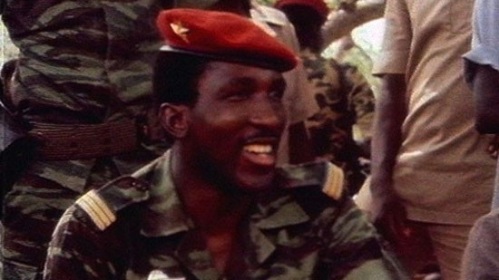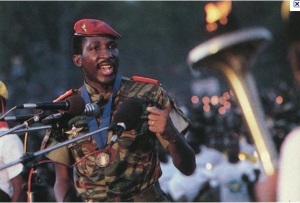Captain Thomas Isidore Noel Sankara is the late Burkinabe military captain, Marxist revolutionary, Pan African theorist and the President of Burkina Faso from 1983 to 1987. He is more popularly known as The Upright Man. He was born on the 21st of December 1949 in Yako, Burkina Faso.
He rose to power through a popular revolution or coup in what was known as Upper Volta in West Africa. He was only 33 at the time. His goal was the socioeconomic and political transformation of his nation, eliminating corruption, oppression, exploitation and dominance of France, the former colonial power.
He renamed Upper Volta and called the new country Burkina Faso which literally means Land of Upright Man, hence his popular moniker.
Sankara is remembered for some of the most ambitious and successful programmes for social and economic change he implemented when he came to power. Within four years, he transformed Burkina Faso from an impoverished nation to a self reliant country through his commitment and drive to transform his political and moral ideology into action.
He conducted a struggle against imperialism, foregoing foreign aid for his government, nationalising the land and mineral wealth, neutralising the International Monetary Fund and World Bank.
He was one of the first presidents to launch a tree planting programme to arrest the desertification of the Sahel, agrarian self sufficiency, local production of Burkinabe goods, nationwide literacy campaigns and vaccination programmes.
These are only a few examples of his programmes. It is by no means an exhaustive list. He was deeply committed to the liberation of women from exploitation and oppression by outsiders and society and culture.
He banned female circumcision, forced marriages, polygamy, expelling girls from school when they fell pregnant. Sankara appointed women to high governmental positions, employed women in the army, encouraged them to be employed outside the home and set up committees and institutions to tackle women’s liberation.
This article is not going to focus on his accomplishments and programmes. The focus is on his words and ideas and one of his concerns – Women’s Liberation.
Therefore, I have chosen 27 quotes, mainly from The book Women’s Liberation and the African freedom Struggle. The book features two speeches. The first, Women’s Liberation and the African freedom Struggle, was made he made in 1987.
The second, Women’s role in the democratic and popular revolution, was made earlier on the 2nd of October 1983. I was reading the book and was going to write and post a review. However, time was not on my side.
Therefore, I thought that 27 quotes, one for each year since he passed away, was a befitting way to remember Thomas Sankara through his own words and ideas and something, women’s liberation, that concerned him very much while he was still alive.
In a sense, it captures the essence of Thomas Sankara and provides a focus on the man himself, his convictions and his essence without an interpreter or narrator providing their own opinion of what they made or understood of the Upright Man.
Look forward to the review in a few days. In the meantime enjoy these quotes and please share them so that more people become aware of Sankara and what he stood for; his ideas, his quest for the liberation of the oppressed worldwide and women’s liberation.
In his own words, “While revolutionaries as individuals can be murdered, you cannot kill ideas”. He would happy that his ideas are still alive and are a source of inspiration to the people he sacrificed his life for – you and me – and humanity.
- The weight of age-old traditions in our society has relegated women to the rank of beasts of burden. Women suffer doubly from all the scourges of neocolonial society. First, they experience the same suffering as men. Second they are subjected to additional suffering by men.
- Our revolution is in the interests of all the oppressed and all those who are exploited in today’s society. It is therefore in the interests of women, since the basis of their domination by men lies in the system through which society’s political and economic life is organised. By changing the social order that oppresses women, the revolution creates the conditions for their genuine economic emancipation.
- The men and women of our society are all victims of imperialist oppression and domination. That is why they wage the same battle.
- The liberation and women’s liberation go together. We do not talk of women’s emancipation as an act of charity or out of a surge of human compassion. It is a basic necessity for the revolution to triumph. Women hold up the other half of the sky.
- A diploma is not a free pass to emancipation.
- We must have a correct understanding of the question of women’s emancipation. It is not a mechanical equality between men and women, acquiring habits recognised as male – drinking, smoking and wearing pants. That’s not emancipation. Nor will acquiring diplomas make women equal to men or more emancipated. A diploma is not a free pass to emancipation.

- The genuine liberation of women is one that entrusts responsibilities to women, that involves them in productive activity and in different fights the people face. The genuine emancipation of women is one that compels men to give their respect and consideration. Emancipation, like freedom, is not granted, it is conquered. It is for women themselves to put forward their demands and mobilize to win them.
- Could it be possible to eliminate the system of exploitation while maintaining the exploitation of women, who make up more than half of our society?
- The final goal of this great understanding is to build a free and prosperous society in which women will be equal to men in all spheres.
- We should be conscious of the battles that have been waged, the successes that have been achieved, the setbacks that have been suffered, and the difficulties that have been encountered. This will aid us in further preparing and leading future struggles.
- It now falls to you to act with the great sense of responsibility in breaking through all the chains and shackles that enslave women in backward societies like ours and to assume your share of the responsibilities in the political fight to build a new society at the service of Africa and at the service of all humanity.
- As long as women don’t have a clear appreciation of the just nature of the political battle to be fought and don’t see clearly how to take it forward, we can easily stop making headway and eventually slip backward.
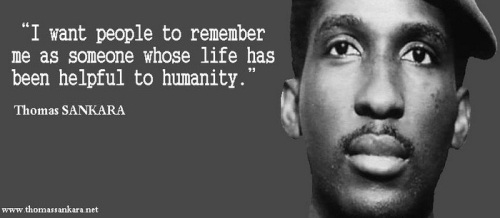
- Education and economic emancipation, if not well understood and channelled in a constructive direction, can be be a source of misfortune for the woman and thus for society as a whole.
- Our women should not retreat in face of the so many-sided struggles that lead a woman to take charge of herself fully and proudly, so as to discover the happiness of being herself, not the domesticated female of the male.
- We must say again to our sisters that marriage, if it brings society nothing positive and does not bring them happiness, is not indispensable and should be avoided.
- As revolutionaries, we should see to it that marriage is a choice that adds something positive, and not some kind of lottery where we know what the ticket costs us, but have no idea what we’ll end up winning. Human feelings are too noble to be subjected to such games.
- The revolution cannot triumph without the genuine emancipation of women.
- Women, like men, have qualities and weaknesses – which undoubtedly proves they are equal to men. Placing the emphasis deliberately on women’s qualities in no way means we have an idealistic vision of them. We simply aim to single out the qualities and capacities that men and society have always hidden in order to justify their exploitation and subjugation of women.
- Though our resources are ridiculously small, our goals are ambitious. The will to go forward and our firm conviction are not sufficient to make our wager succeed. We must marshall our forces – all our forcs, organise them, and channel them toward winning our struggle.
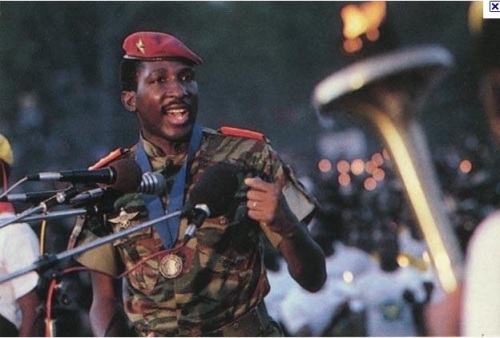
- We should avoid shirking responsibilities, which has led to a failure to bring all forces into the struggle and to making this pivotal question of women’s emancipation into a marginal one. We must avoid rushing ahead, leaving far behind those, especially the women, who should be on the frontlines.
- It’s in the heat of the struggle that important and decisive victories are won.
- Conceiving a development project without the participation of women is like using only four fingers when you have ten. It’s an invitation to failure.
- It is an obvious fact that wherever women have had access to education, their march to equality has been accelerated. Emerging from the darkness of ignorance allows women to take up and use the tools of knowledge in order to place themselves at the disposal of society.
- Living in squalor produces squalid relations. Look at the pigs if you don’t believe me.
- For the time being, we have no choice but to recognise that male behaviour – made up of vanity, irresponsibility, arrogance, and violence of all kinds toward women – can in no way result in coordinated action against women’s oppression. What can be said of these attitudes, which can sink to the level of stupidity, and which in reality are nothing but a safety valve for oppressed males, who, through brutalising their wives, hope to regain some of the human dignity denied them by the system of exploitation. This male stupidity is called masichismo. It includes moral and intellectual impoverishment of all types, even (acknowledged or not) physical powerlessness, which often compels politically conscious women to consider it their duty to fight on two fronts.

- We must pay close attention to the situation of women because it pushes the best of them to talk of a war of the sexes, when what we really have is a war of social groups and of social classes that should simply be waged together, with men and women complementing each other. We have to say frankly that it’s the attitude of men that makes such confusion possible. That in turn paves the way for the bold assertions made by feminism, some of which have not been without value in the fight that men and women are waging against oppression. This fight is one we can and will win – if we understand that we need one another and are complementary, and finally, if we understand that we are condemned to being complementary.
- Comrades, there is no true social revolution without the liberation of women. May my eyes never see and my feet never take me to a society where half the people are held in silence. I hear the roar of women’s silence. I sense the rumble of their storm and feel the fury of their revolt. I await and hope for the fertile eruption of the revolution through which they will transmit the strength and the rigorous justice issued from their oppressed wombs.
Keep your eyes peeled for two book reviews coming within the next few days. The first is Woman’s liberation and the African freedom struggle based on speeches by the late Captain Thomas Isidore Noel Sankara.
The second is I Write What I Like written by the late Steve Bantu Biko. It is a compilation of his speeches, letters, reports, articles and interviews. Don’t miss them. Thanks for reading. Spread the word. Spread the ideas.


